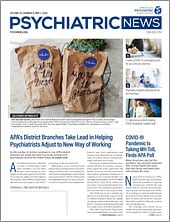Prolongation of the QT interval on the 12-lead electrocardiogram (ECG) is a primary drug-safety benchmark used by the Food and Drug Administration when assessing medications for cardiac risk. A variety of mathematical formulae, programmed into ECG machines, are used to arrive at a corrected QT interval (QTc), which corrects for heart rate extremes (higher or lower).
The use of certain psychotropic medications can increase the risk of QTc prolongation and Torsades de pointes (TdP), a potentially fatal ventricular arrhythmia. Over the past decade, physicians have become more aware of the potential for TdP with the use of psychotropic medications, but there is significant variability in practice and policy at the individual and institutional levels.
To address this gap, the APA Council on Consultation-Liaison Psychiatry’s Workgroup on QTc Prolongation and Psychotropic Medications created a comprehensive set of clinical considerations, which are endorsed by the American College of Cardiology. They are posted as a resource document on APA’s website and published in the March American Journal of Psychiatry.
There is not an absolute QTc value at which a psychotropic medication should not be used. A pretreatment QTc greater than 500 ms should trigger a comprehensive risk-benefit analysis, weighing the risk of TdP with the benefits of proceeding with the medication. When the treatment team is considering the withholding of a psychotropic medication, the team should carefully consider the impact of psychiatric decompensation and/or failure to control high-risk psychopathology.
In patients with significant cardiac risk factors, psychotropic medications with a known risk to prolong the QTc interval or those with a regulatory warning should be avoided when relatively safer alternatives are available. Many risk factors other than medications—both modifiable and nonmodifiable—can increase the risk of TdP independently. Thus, when conducting a risk-benefit analysis, psychiatrists must be aware that combinations of these risk factors, including co-administration of two or more QTc-prolonging medications, can create cumulative risk.
Unfortunately, the quality of studies measuring the level of risk associated with medications is variable. Moreover, there is no uniformity among various professional guidelines, FDA drug safety recommendations, and those of other international regulatory bodies.
To further complicate matters, the most commonly used formula for measuring QT heart-rate correction—the Bazett formula, which is programmed into most ECG machines—is known to be unreliable. Evidence is mixed about which formula is best, but most other formulae (Fridericia, Framingham, Hodges, Nomogram) have proven more reliable than Bazett.
Ideally, psychiatrists should be proficient at ECG interpretation and thoughtful about the use of recommended heart-rate correction formulae. The absence of a cardiologist (or physician from any other medical specialty) to read an ECG should not preclude obtaining one when it is indicated.
Routine cardiology consultation is not indicated when prescribing QTc interval–prolonging medications to a patient without cardiac risk factors. However, when significant cardiac disease and/or other risk factors for QTc interval prolongation are present, cardiology input should be considered.
Psychiatrists should feel empowered to fully utilize their skills as physicians first, recognizing that they have the ability and authority to make complex psychopharmacologic treatment decisions. Psychiatrists should and will be looked to as the experts on complex psychopharmacology and must be comfortable understanding associated levels of cardiac risk. ■
“QTc Prolongation and Psychotropic Medications” is posted
here.

